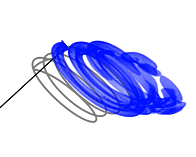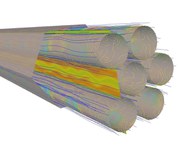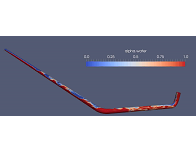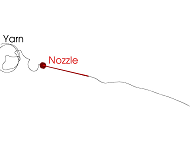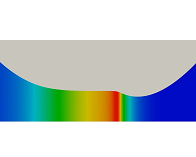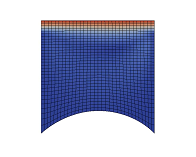Fluid mechanics
The Fluid Mechanics team specializes in numerical simulation of fluid-structure interaction (FSI) using computational fluid dynamics (CFD) and computational solid mechanics (CSM), with focus on the fluid mechanics. We develop quasi-Newton coupling algorithms for partitioned simulation of FSI. We apply them in various fields by solving challenging FSI problems in the energy transition and in industry.
Coupling algorithms
We develop and analyze quasi-Newton algorithms for partitioned simulation of fluid-structure interaction (FSI) and other coupled problems. These coupling algorithms mostly consider the solvers as black boxes and create least-squares models during the coupling iterations, but also other information can be used to accelerate the convergence.
The coupling techniques that we developed (IQN-ILS, IBQN-LS, IQN-ILSM, ...) have been implemented in CoCoNuT. They have also been adopted by other coupling tools, such as preCICE and Ansys System Coupling. Our review paper compares these algorithms and shows how they scale with changing interface size:
N. Delaissé, T. Demeester, R. Haelterman, and J. Degroote. Quasi-Newton methods for partitioned simulation of fluid-structure interaction reviewed in the generalized Broyden framework. Archives of Computational Methods in Engineering, 30:3271-3300, 2023. doi: 10.1007/s11831-023-09907-y.
Challenging FSI problems
We are solving various challenging FSI problems in the energy transition and in industry by coupling a flow solver with a structural solver. This research is often in collaboration with another research group at Ghent University, such as Coastal Engineering, Mechanics of Materials and Structures (composites), Dynamic Design Lab (control), Biomedical Engineering and Technology and Soete Laboratory (lubrication), or a project partner.
Teaching
The Fluid Mechanics team contributes to the following courses:
- Aeroplanes
- Computational Fluid Dynamics
- Fluid Mechanics
- Fluid Machines
- Numerical Optimisation
- Turbomachines
The master thesis topics can be found here, showing the new topics from 1st of April and otherwise the ones from last year.
Downloads
- CoCoNuT, open source object-oriented Python code, short for Coupling Code for Numerical Tools.
- Tango, object-oriented MATLAB implementation of IQN-ILS.
- Source code of the paper J. Degroote, M. Hojjat, E. Stavropoulou, R. Wüchner, and K.-U. Bletzinger. Partitioned solution of an unsteady adjoint for strongly coupled fluid-structure interactions and application to parameter identification of a one-dimensional problem. Structural and Multidisciplinary Optimization, 2012.
- Source code for SUpPSB, SUgPSB, SGOMS by Nicolas Boutet (RMA and UGent)
- Data of the paper J. Degroote, A. Souto-Iglesias, W. Van Paepegem, S. Annerel, P. Bruggeman, and J. Vierendeels. Partitioned simulation of the interaction between an elastic structure and free surface flow. Computer Methods in Applied Mechanics and Engineering, 199(33-36):2085-2098, 2010.
- Geometry of the paper B. Vanderhoydonck, G. Santo, J. Vierendeels, and J. Degroote. Optimization of a human-powered aircraft using fluid-structure interaction simulations. Aerospace, 3(3):1–25, 2016.
